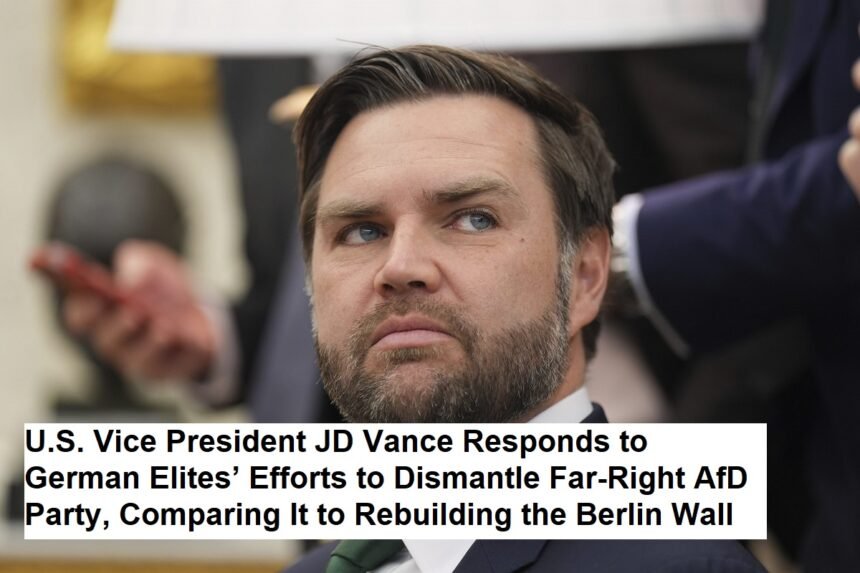In a recent statement, U.S. Vice President JD Vance addressed the ongoing political tensions in Germany surrounding the far-right Alternative for Germany (AfD) party. Vance criticized the actions of German political elites who are reportedly seeking to dismantle or marginalize the AfD, likening these efforts to the symbolic rebuilding of the Berlin Wall—a divisive and oppressive barrier that once split Germany.
Background: The AfD and German Political Climate
The Alternative for Germany (AfD) is a right-wing populist party that has gained significant support in recent years, particularly in eastern Germany. Known for its nationalist, anti-immigration, and Eurosceptic positions, the AfD has become a controversial force in German politics.
German political elites, including mainstream parties and influential figures, have expressed strong opposition to the AfD, viewing it as a threat to democratic values and social cohesion. Efforts to limit the party’s influence have included legal challenges, media campaigns, and political isolation.
JD Vance’s Critique
Vice President JD Vance, known for his conservative views and advocacy for populist movements, condemned the German elites’ approach. He argued that attempting to “destroy” the AfD is akin to rebuilding the Berlin Wall—a metaphor for erecting new barriers that divide society and suppress political dissent.
Vance emphasized that political pluralism and free expression are essential components of democracy. He warned that marginalizing legitimate political voices risks alienating segments of the population and deepening societal fractures.
Implications of the Comparison
The Berlin Wall, which stood from 1961 to 1989, symbolized the division between East and West Germany and the broader ideological conflict of the Cold War. By comparing the elites’ actions to rebuilding the wall, Vance highlighted the dangers of political exclusion and authoritarian tendencies.
His statement suggests that efforts to suppress the AfD could backfire, fostering resentment and undermining democratic principles. Vance called for engagement and dialogue rather than exclusion.
Reactions in Germany and Internationally
Vance’s remarks sparked debate both within Germany and internationally. Supporters of the AfD welcomed his defense of political pluralism, while critics accused him of legitimizing extremist views.
German mainstream parties reaffirmed their commitment to countering the AfD’s influence, citing concerns over the party’s rhetoric and policies. The controversy underscores the challenges democracies face in balancing free speech with combating extremism.
Broader Context
The situation reflects wider global trends where populist and far-right parties challenge established political orders. Governments and societies grapple with how to respond—whether through engagement, exclusion, or legal measures.
Vance’s comments contribute to this discourse, advocating caution against heavy-handed tactics that may erode democratic norms.
In summary, U.S. Vice President JD Vance criticized German elites’ efforts to dismantle the far-right AfD party, comparing such actions to rebuilding the Berlin Wall. He warned that political exclusion risks deepening divisions and undermining democracy, calling instead for open dialogue and pluralism.








